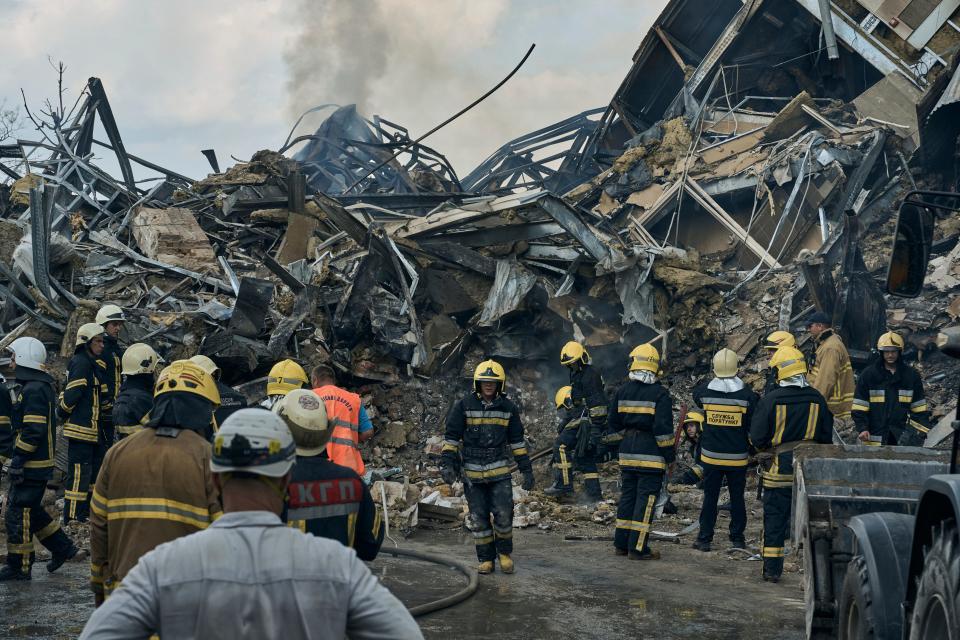Ukraine stopped Russian cruise missiles from taking out a cargo ship in the Black Sea as Putin tries to 'weaponize food,' UK says
Russian forces fired two Kalibr cruise missiles at a cargo ship in the Black Sea last month.
But Ukraine's air defenses successfully shot down the missiles, the UK revealed on Monday.
The brazen attack comes after Moscow stepped up threats against civilian vessels in the region.
Ukraine thwarted a Russian missile attack on a cargo ship in the Black Sea last month, the UK government revealed on Monday, citing new intelligence.
The attempted strike, though ultimately foiled, marked perhaps the most serious attack on a civilian vessel since Russia withdrew from the crucial Black Sea grain deal several weeks earlier and began ramping up threats against ships transiting the region, recklessly warning that they would be considered potential carriers of military cargo.
Britain's foreign office said in a statement that on August 24, a missile carrier belonging to Russia's Black Sea Fleet fired two Kalibr cruise missiles at a Liberian-flagged cargo ship that was moored at a port in the southern Ukrainian city of Odesa, but they were "successfully shot down" by Kyiv's air-defense systems.
"Thanks to declassified intelligence we know the Russian military targeted a civilian cargo ship in the Black Sea with multiple missiles," UK Prime Minister Rishi Sunak said in remarks to lawmakers on Monday, although he did not elaborate on the specifics of the intelligence.
It's unclear what time, exactly, the attack took place, although Ukraine's air force said on August 25 that it destroyed missiles targeting the Odesa region during the previous night.

After Russia killed the grain deal in mid-July, it warned that all vessels transiting the Black Sea would be treated as potential carriers of military cargo, operating on behalf of the Ukrainian government, and would not be offered any safety guarantees.
The announcement immediately raised concerns over the safety of shipping in the region. The White House said in response that it believed Moscow was trying to justify attacks on civilian ships and blame the incidents on Ukraine.
Moscow appeared to follow through on its threat for the first time several weeks later, when its forces fired warning shots at a Palau-flagged cargo ship and the carried out a helicopter raid of the vessel. Though the Russian defense ministry said its troops searched the vessel for "prohibited goods," it ultimately allowed the ship to keep sailing to a Ukrainian port city.
Ukraine has tried to remedy the threat by establishing a protected shipping corridor to allow for safe transit through dangerous Black Sea waters. But news of the attempt to deliberately attack the Liberian-flagged cargo ship represents a deadly escalation.
Russian President Vladimir Putin "is trying to win a war he will not win, and these attacks show just how desperate he is," UK Foreign Secretary James Cleverly said in the Monday statement. "In targeting cargo ships and Ukrainian infrastructure, Russia is hurting the rest of the world."

Since Russia withdrew from the grain deal, it has also increasingly targeted Ukrainian cities, ports, and food storage buildings along the Black Sea with relentless missile and drone strikes, killing and injuring scores of civilians. These attacks have also damaged dozens of grain infrastructure facilities and destroyed nearly 300,000 tons of grain, preventing critical supplies from reaching vulnerable countries around the world, according to the UK.
"Russia has stopped even attempting to justify that these attacks are against legitimate military targets and is cynically targeting civilian infrastructure. President Putin's intentions are clear for all to see. This is a brutal attempt to choke the Ukrainian economy," Britain's foreign office said on Monday.
"While the UK and our partners continue to do all we can to ensure Ukraine's exports reach those who need it most, this pattern of deliberately targeted attacks in the Black Sea by Russia demonstrates President Putin's willingness to weaponise food and innocent trade at the expense of the rest of the world as they block food from reaching world markets," it added.
To deter against Russian attacks on civilian ships, the British government said last week that Royal Air Force aircraft are conducting surveillance flights above the Black Sea so they can monitor any potential preparations by Moscow to launch an assault on shipping or infrastructure.
Read the original article on Business Insider

 Yahoo News
Yahoo News 
